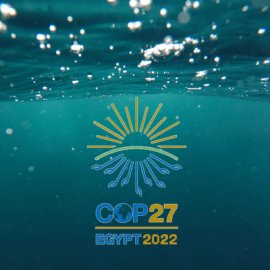COP27
-
English
-
ListenPause
[intro music]
Welcome to World Ocean Radio…
I’m Peter Neill, Director of the World Ocean Observatory.
COP 27, the 27th Conference of the Parties, is where decisions related to the United Nations Framework Convention on Climate Change are presented, discussed, negotiated, and approved as on-going commitments to a global strategy for the reduction of carbon emissions, global warming, sea level rise, and all ancillary consequences that affect the world population and the earth. It is an intense, formal and informal interaction of state leaders, policies, associated science, national, regional, and international pledges of action, funds, and cooperation toward solution of what many characterize as “the crisis of our age.” As the UN Secretary General described the moment and the meeting, “It is a either a sustainability pact, or a collective suicide pact.”
The meeting comprises plenary sessions and major presentations, hundreds of side events, even more hundreds of corridor conversations and draft exchanges among heads of states, ministers, national and international bankers, policy and legal experts, corporate executives, philanthropists, NGO managers, and environmentalists – all attempting to draft effective recommendations, elicit financial commitments, and agree on the nuances of a final report that will become the new plan for global action, supplanting the last one which remains unachieved.
What to expect? One can take a cynical approach based on past performance when pledges have been made, both specific goals to be met and funds to be invested, that have eroded as a result of some hypocrisy, or more politely, a predictable lack of original intent, a global pandemic, an unexpected war in Europe, and ensuing threat of world inflation and economic hazard. The core of it all is energy, oil, gas, and coal, on which the world economy has historically depended, and the diminished consequence of which is at the center of global climate strategy. Chinese dependence on coal, and European dependence on Russian oil are key. The American oil companies and the other producing nations, Saudi Arabia and the other OPEC members, are fellow travelers, profiting handsomely from undiminished need. The value of alternative technology and production increases, but not to scale. Methane release levels are highly elevated. Glaciers and sea ice melt are accelerating, In 2022, global carbon emissions are projected to reach record highs.
Certain agenda items at COP 27 are, however, interesting and encouraging. There has been a fulsome discussion, put forward by the European Union, of a global non-proliferation treaty for oil and gas, comparable to the one that transformed and delimited the expansion of nuclear weapons. There has been an open discussion of “loss and damage,” the measurable impact, especially on developing nations, of changing climate conditions on air quality, food production, water, public health, and more. How, and by what means, might rich countries reimburse or repair the devastation caused elsewhere by their culture of consumption and abundance? To do this, how will committed funds be allocated? Will the international finance agencies modify their past areas of interest and restrictions to become dedicated trustees of such funds and accountable agency for equitable distribution?
Will national commitments actually be forthcoming, not diluted or prolonged as they have been since COP26? What kind of partnerships and efficiencies can be realized to deal with regional challenges? In southeast Asia, India, and Africa, to enable transitions? Will methane emissions be curtailed at last? Can carbon markets become real? Can “greenwashing” of projects be controlled and protected, public awareness exposing investment products that aren’t what they say, or fail to do what they claim?
The Conference of the Parties is a fascinating, complicated thing, combining science, policy, vested national interests, private agendas, and citizen demand into a public declaration of intent, a detailed set of aspirational exigencies and specific actions that must be taken. The final communique will make for subtle reading. Truth will be in the details. The details will be a function of actual funding received. Funding received will determine the actual steps taken in a timeline of one year, one decade, one global transformation, that will be measured for success, incrementally, by COP 28, to be held in Dubai, United Arab Emirates, next November, and by those Conferences of the P arties that follow.
Sustainability, or suicide? That’s the question.
We will discuss these issues, and more, in future editions of World Ocean Radio.
[outro music]
This week on World Ocean Radio we're discussing COP27, the annual Conference of the Parties, that took place this year in Sharm el-Sheikh, Egypt. What should we expect for outcomes of the conference? Empty pledges and resolutions unmet? Or will actionable, lasting national commitments be forthcoming and methane emissions at last curtailed? The truth will be in the details.
About World Ocean Radio
5-minute weekly insights dive into ocean science, advocacy and education hosted by Peter Neill, lifelong ocean advocate and maritime expert. Episodes offer perspectives on global ocean issues and viable solutions, and celebrate exemplary projects. Available for syndicated use at no cost by college and community radio stations worldwide.
Image
COP27 | unfccc.int
- Login to post comments



